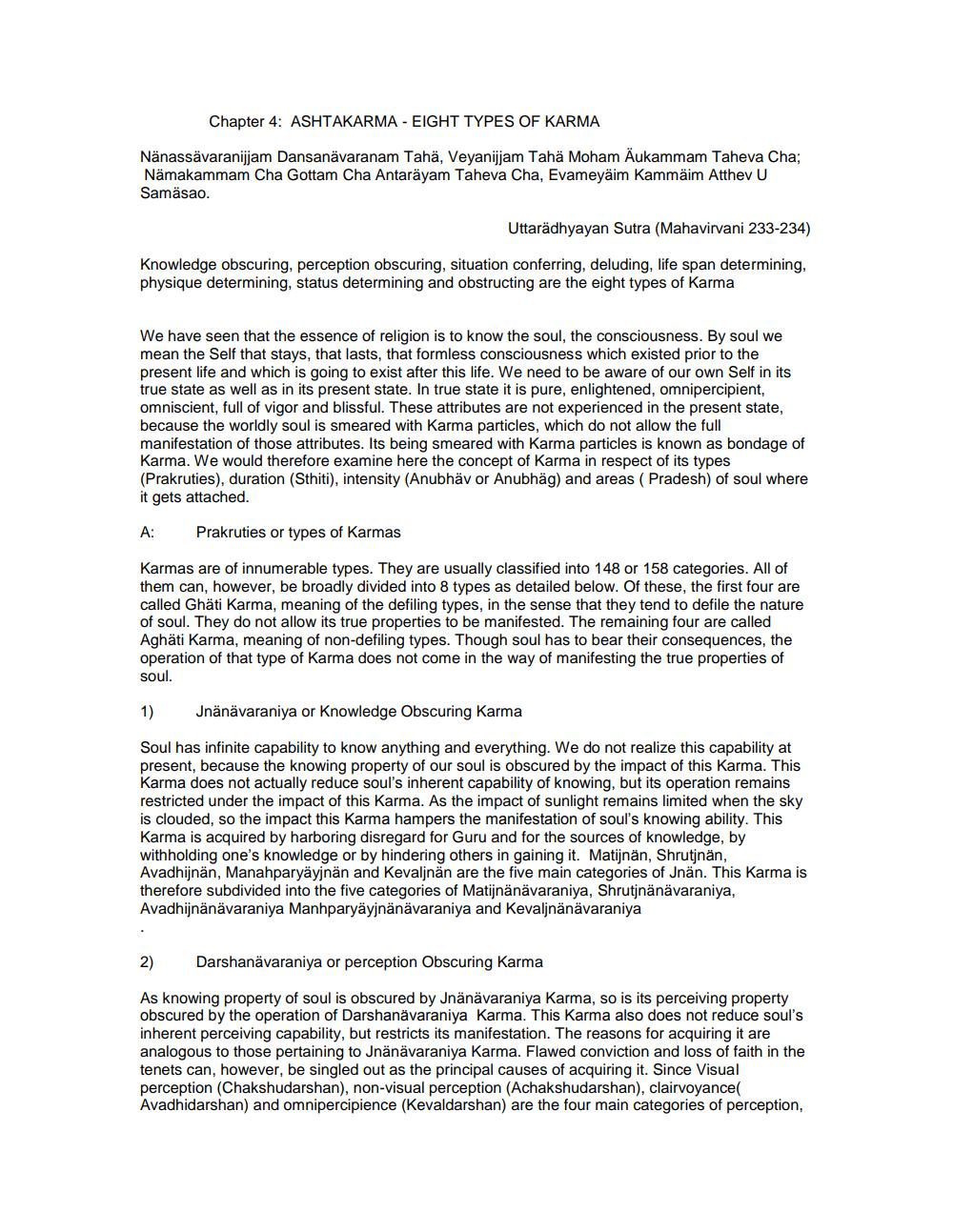Book Title: Essence of Jainism Author(s): Manu Doshi Publisher: Manu Doshi View full book textPage 7
________________ Chapter 4: ASHTAKARMA - EIGHT TYPES OF KARMA Nänassavaranijjam Dansanävaranam Tahä, Veyanijjam Tahä Moham Aukammam Taheva Cha; Nämakammam Cha Gottam Cha Antaräyam Taheva Cha, Evameyaim Kammäim Atthev U Samäsao. Uttaradhyayan Sutra (Mahavirvani 233-234) Knowledge obscuring, perception obscuring, situation conferring, deluding, life span determining, physique determining, status determining and obstructing are the eight types of Karma We have seen that the essence of religion is to know the soul, the consciousness. By soul we mean the Self that stays, that lasts, that formless consciousness which existed prior to the present life and which is going to exist after this life. We need to be aware of our own Self in its true state as well as in its present state. In true state it is pure, enlightened, omnipercipient, omniscient, full of vigor and blissful. These attributes are not experienced in the present state, because the worldly soul is smeared with Karma particles, which do not allow the full manifestation of those attributes. Its being smeared with Karma particles is known as bondage of Karma. We would therefore examine here the concept of Karma in respect of its types (Prakruties), duration (Sthiti), intensity (Anubhav or Anubhäg) and areas ( Pradesh) of soul where it gets attached. A: Prakruties or types of Karmas Karmas are of innumerable types. They are usually classified into 148 or 158 categories. All of them can, however, be broadly divided into 8 types as detailed below. Of these, the first four are called Ghäti Karma, meaning of the defiling types, in the sense that they tend to defile the nature of soul. They do not allow its true properties to be manifested. The remaining four are called Aghäti Karma, meaning of non-defiling types. Though soul has to bear their consequences, the operation of that type of Karma does not come in the way of manifesting the true properties of soul. 1) Jnänävaraniya or Knowledge Obscuring Karma Soul has infinite capability to know anything and everything. We do not realize this capability at present, because the knowing property of our soul is obscured by the impact of this Karma. This Karma does not actually reduce soul's inherent capability of knowing, but its operation remains restricted under the impact of this Karma. As the impact of sunlight remains limited when the sky is clouded, so the impact this Karma hampers the manifestation of soul's knowing ability. This Karma is acquired by harboring disregard for Guru and for the sources of knowledge, by withholding one's knowledge or by hindering others in gaining it. Matijnän, Shrutjnän, Avadhijnän, Manahparyäynän and Kevaljnän are the five main categories of Jnän. This Karma is therefore subdivided into the five categories of Matijnänävaraniya, Shrutinänävaraniya, Avadhijnänävaraniya Manhparyäyjnänävaraniya and Kevaljnänävaraniya Darshanävaraniya or perception Obscuring Karma As knowing property of soul is obscured by Jnänävaraniya Karma, so is its perceiving property obscured by the operation of Darshanavaraniya Karma. This Karma also does not reduce soul's inherent perceiving capability, but restricts its manifestation. The reasons for acquiring it are analogous to those pertaining to Jnänävaraniya Karma. Flawed conviction and loss of faith in the tenets can, however, be singled out as the principal causes of acquiring it. Since Visual perception (Chakshudarshan), non-visual perception (Achakshudarshan), clairvoyance Avadhidarshan) and omnipercipience (Kevaldarshan) are the four main categories of perception,Page Navigation
1 ... 5 6 7 8 9 10 11 12 13 14 15 16 17 18 19 20 21 22 23 24 25 26 27 28 29 30 31 32 33 34 35 36 37 38 39 40 41 42 43 44 45 46
